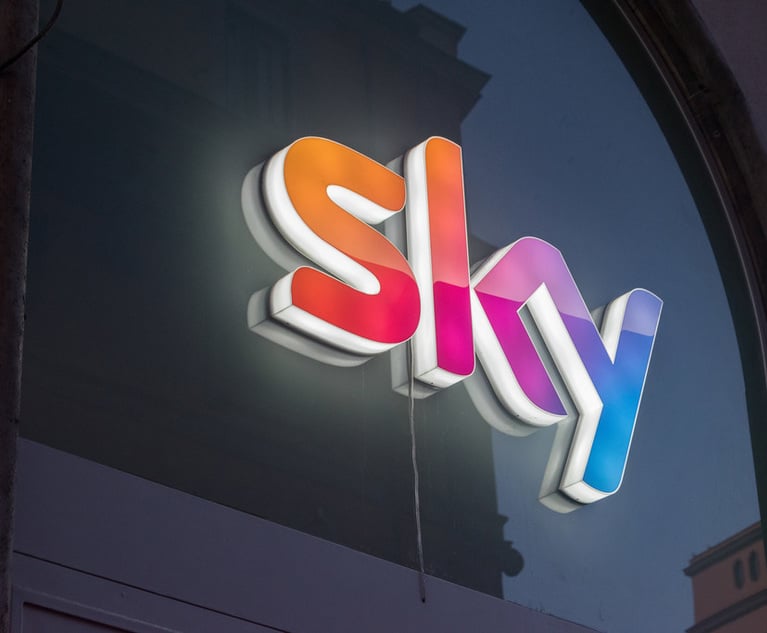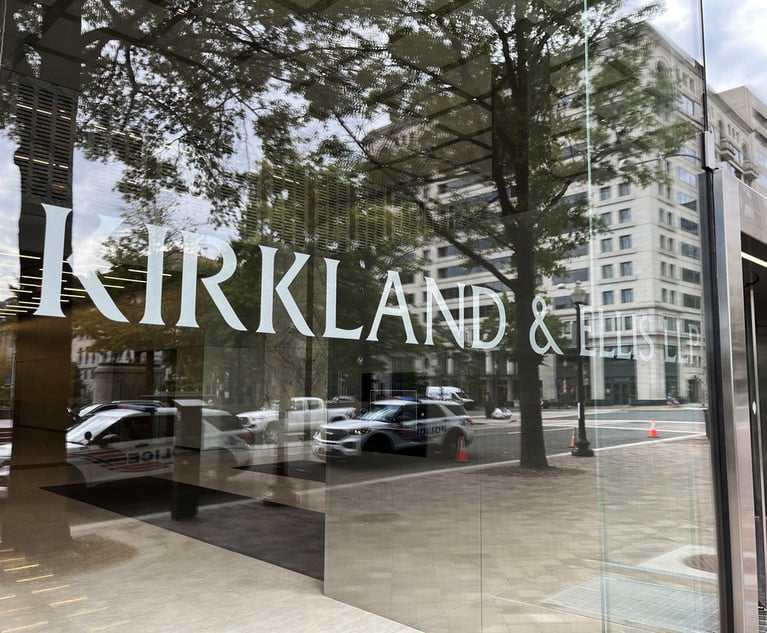The law of luxury goods
With few industries performing better than the €185bn (£148bn) luxury goods sector, a rising number of lawyers and law graduates are electing it as their business development focus.
September 28, 2012 at 06:20 AM
5 minute read
With few industries performing better than the €185bn (£148bn) luxury goods sector, a rising number of lawyers and law graduates are electing it as their business development focus.
The luxury industry is a difficult niche market to break into for lawyers. They have to deploy their charm as well as their brains to be recognised by luxury goods companies, designers, retailers, importers, distributors, artists and auction houses as efficient trusted advisors.
The concepts of "droit du luxe" (luxury law) in France and "fashion law" in the US have been created in the last decade. With a 50% increase in the global turnover of luxury goods companies in the last ten years, there is rising awareness among legal professionals that the era of luxury law and fashion law has started.
Today, appointing top lawyers is the best option for the business, no matter how costly their services may initially seem to be, as stiff competition within the luxury sector and numerous external threats to the wellbeing of luxury brands intensify.
As an example of this sectorial competition, the story of how the Arnault group used the law to gain control of LVMH, the largest luxury goods company in the world, in the late 80s, is telling: after the merger between Louis Vuitton and Moet-Hennessy, the Arnault group acquired more than 93% of the warrants coming from the Moet-Hennessy bonds with equity warrants ("obligations avec bons de souscription d'action" or OBSAs). The Arnault group took advantage of the fact that the legal framework applying to OBSAs, a new type of composite securities at the time, was still relatively unknown to French courts. Further to a fierce four years' legal battle, which led to the refusal by French courts to declare the litigious issue of OBSAs void, the Arnault group overpowered LVMH minority shareholders.
Legal risks lie not only inside the industry but also arise out of the heavily regulated trading framework which luxury goods companies must comply with. A decision from the Paris Court of Appeal, given on 26 January 2012, confirmed the existence of price-fixing agreements and anti-competitive behaviour between thirteen perfume and cosmetics producers (among which Chanel, Guerlain, Parfums Christian Dior and Yves Saint Laurent Beaute) and their three French distributors (Sephora, Nocibe France and Marionnaud). The court also upheld the judgment of the French competition authority, dated 14 March 2006, sentencing each of these luxury goods companies and distributors to fines valued at €40m (£32m) overall. Since the brand and halo of luxury goods houses are their main assets, such legal wrongdoings may have a catastrophic impact on their reputation. This is a warning bell for luxury goods houses that lawyers must be involved at the very early stages of the structuring of their distribution networks, in order to avoid any further breach to competition law.
Another critical external risk that all directors of luxury goods companies are eager to protect themselves from is the infringement of their intellectual property rights, and in particular, brand dilution and the weakening of brand image. Lawyers are the best weapon luxury goods companies can use to fight against counterfeiting, especially now that so many counterfeited products are sold on the Internet.
Lawyers are also actively supporting luxury goods companies in capitalising on the growing opportunities represented by the demand for luxury goods, in Asia, the Middle East and the CIS. Selective distribution allows manufacturers to choose retailers on the basis of qualitative criteria and to insure that distribution of their products will comply with conditions befitting the "luxury sensation" these manufacturers attribute to their products. Luxury goods are therefore mainly marketed through selective distribution, a more flexible and controllable channel than exclusive distribution or franchising. The role of lawyers is critical in representing the legal interests of luxury goods suppliers during the negotiation and enforcement of such selective distribution agreements, notably to ensure that the management of prestige and rarity, two essential characteristics of luxury goods, is adequately performed.
Lawyers are not only useful for contentious and non-contentious matters, but are developing themselves into spokespersons representing the interests of luxury brands.
The fashion law movement is becoming so meaningful in the US that a Fashion Law Institute was created with the support and advice of the Council of Fashion Designers of America and its president Diane Von Furstenberg. "The academic discipline covers the legal issues that may arise throughout the life of a garment, from its original design and related intellectual property law through questions of business and finance to international trade and government regulation, including sustainability and "green" fashion" says Professor Susan Scafidi of Fordham University School of Law, the Institute's academic director.
The future is bright for lawyers who are well connected within the creative and luxury industries: nice work if you can get it.
The author is a partner at Crefovi, a law firm specialised in providing advice to the creative industries.
This content has been archived. It is available through our partners, LexisNexis® and Bloomberg Law.
To view this content, please continue to their sites.
Not a Lexis Subscriber?
Subscribe Now
Not a Bloomberg Law Subscriber?
Subscribe Now
NOT FOR REPRINT
© 2024 ALM Global, LLC, All Rights Reserved. Request academic re-use from www.copyright.com. All other uses, submit a request to [email protected]. For more information visit Asset & Logo Licensing.
You Might Like
View All
Newly-Appointed Kirkland Clinches Victory at Supreme Court in Longrunning Sky Feud
3 minute read
Latham Suffers Latest Departure as Skadden Swoops for London IP Head
2 minute read
Kirkland & Ellis Triumphs in High Court Cancer Treatment Patent Case

Trending Stories
Who Got The Work
Michael G. Bongiorno, Andrew Scott Dulberg and Elizabeth E. Driscoll from Wilmer Cutler Pickering Hale and Dorr have stepped in to represent Symbotic Inc., an A.I.-enabled technology platform that focuses on increasing supply chain efficiency, and other defendants in a pending shareholder derivative lawsuit. The case, filed Oct. 2 in Massachusetts District Court by the Brown Law Firm on behalf of Stephen Austen, accuses certain officers and directors of misleading investors in regard to Symbotic's potential for margin growth by failing to disclose that the company was not equipped to timely deploy its systems or manage expenses through project delays. The case, assigned to U.S. District Judge Nathaniel M. Gorton, is 1:24-cv-12522, Austen v. Cohen et al.
Who Got The Work
Edmund Polubinski and Marie Killmond of Davis Polk & Wardwell have entered appearances for data platform software development company MongoDB and other defendants in a pending shareholder derivative lawsuit. The action, filed Oct. 7 in New York Southern District Court by the Brown Law Firm, accuses the company's directors and/or officers of falsely expressing confidence in the company’s restructuring of its sales incentive plan and downplaying the severity of decreases in its upfront commitments. The case is 1:24-cv-07594, Roy v. Ittycheria et al.
Who Got The Work
Amy O. Bruchs and Kurt F. Ellison of Michael Best & Friedrich have entered appearances for Epic Systems Corp. in a pending employment discrimination lawsuit. The suit was filed Sept. 7 in Wisconsin Western District Court by Levine Eisberner LLC and Siri & Glimstad on behalf of a project manager who claims that he was wrongfully terminated after applying for a religious exemption to the defendant's COVID-19 vaccine mandate. The case, assigned to U.S. Magistrate Judge Anita Marie Boor, is 3:24-cv-00630, Secker, Nathan v. Epic Systems Corporation.
Who Got The Work
David X. Sullivan, Thomas J. Finn and Gregory A. Hall from McCarter & English have entered appearances for Sunrun Installation Services in a pending civil rights lawsuit. The complaint was filed Sept. 4 in Connecticut District Court by attorney Robert M. Berke on behalf of former employee George Edward Steins, who was arrested and charged with employing an unregistered home improvement salesperson. The complaint alleges that had Sunrun informed the Connecticut Department of Consumer Protection that the plaintiff's employment had ended in 2017 and that he no longer held Sunrun's home improvement contractor license, he would not have been hit with charges, which were dismissed in May 2024. The case, assigned to U.S. District Judge Jeffrey A. Meyer, is 3:24-cv-01423, Steins v. Sunrun, Inc. et al.
Who Got The Work
Greenberg Traurig shareholder Joshua L. Raskin has entered an appearance for boohoo.com UK Ltd. in a pending patent infringement lawsuit. The suit, filed Sept. 3 in Texas Eastern District Court by Rozier Hardt McDonough on behalf of Alto Dynamics, asserts five patents related to an online shopping platform. The case, assigned to U.S. District Judge Rodney Gilstrap, is 2:24-cv-00719, Alto Dynamics, LLC v. boohoo.com UK Limited.
Featured Firms
Law Offices of Gary Martin Hays & Associates, P.C.
(470) 294-1674
Law Offices of Mark E. Salomone
(857) 444-6468
Smith & Hassler
(713) 739-1250









